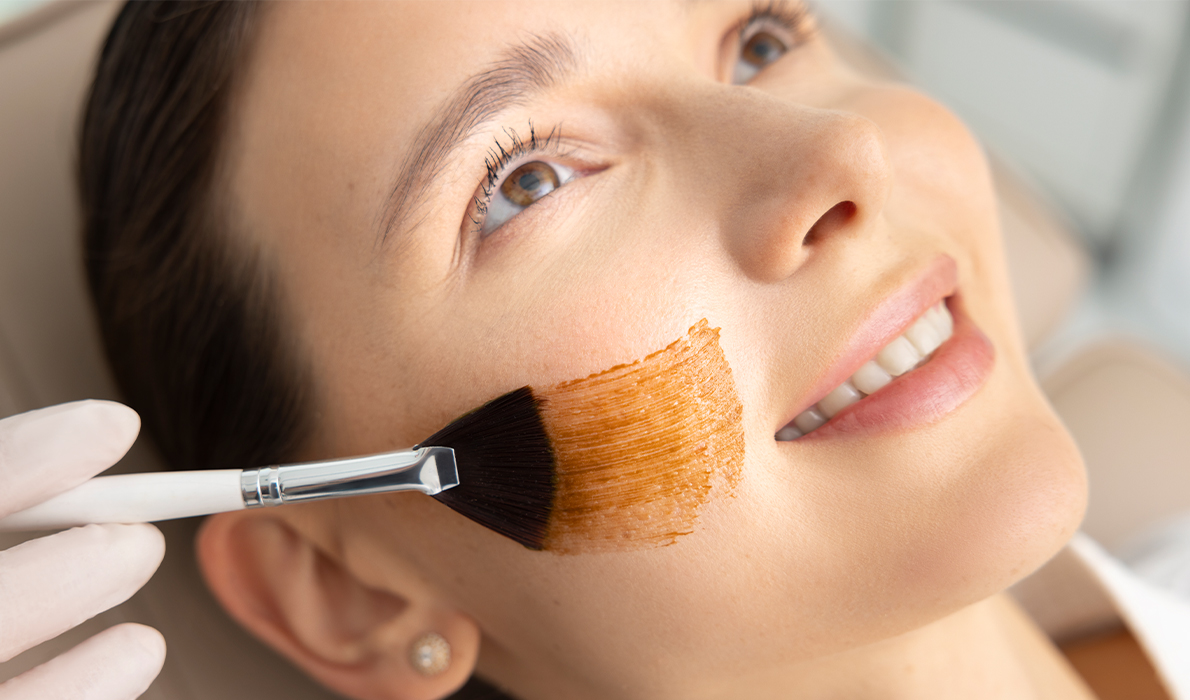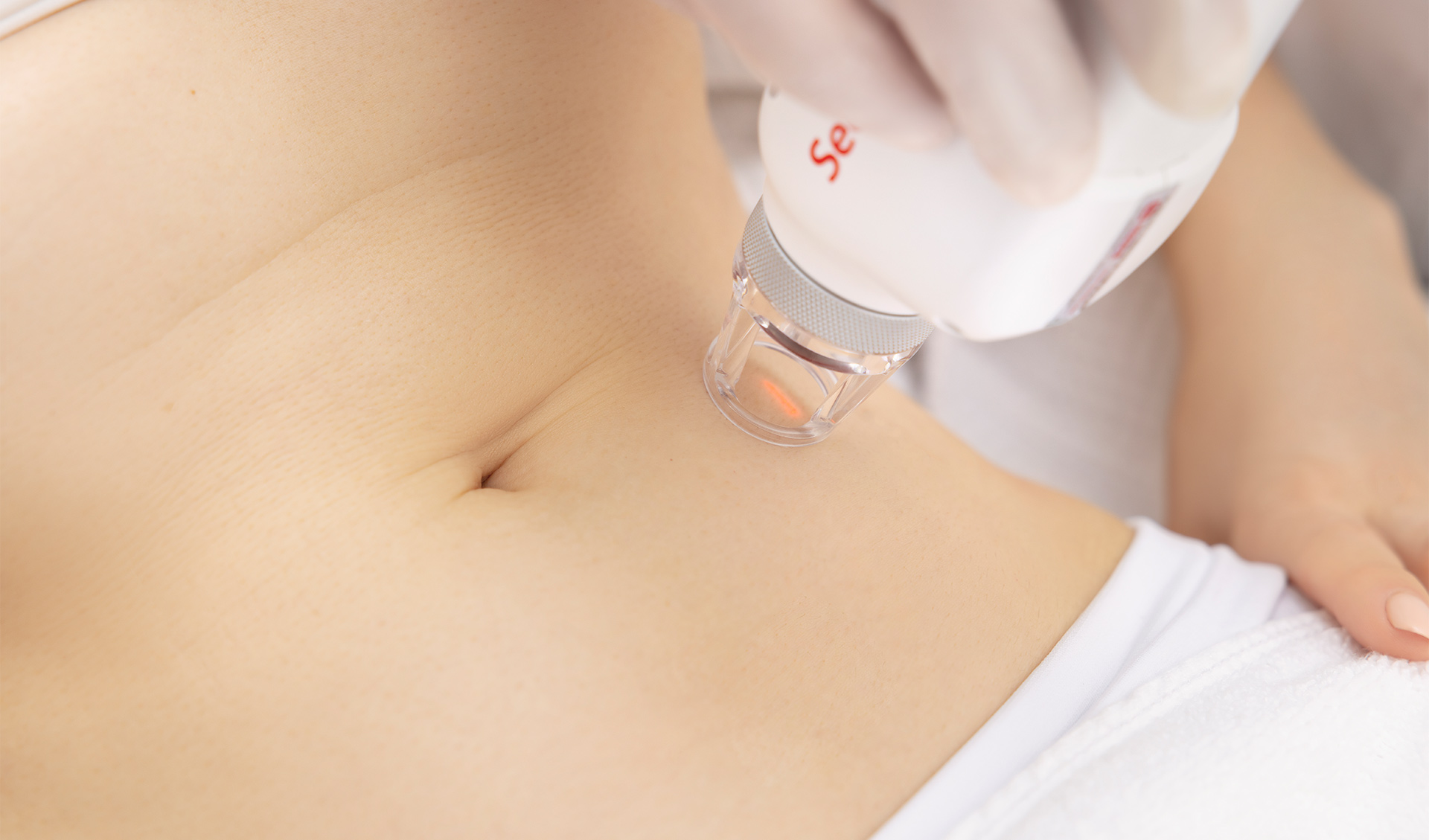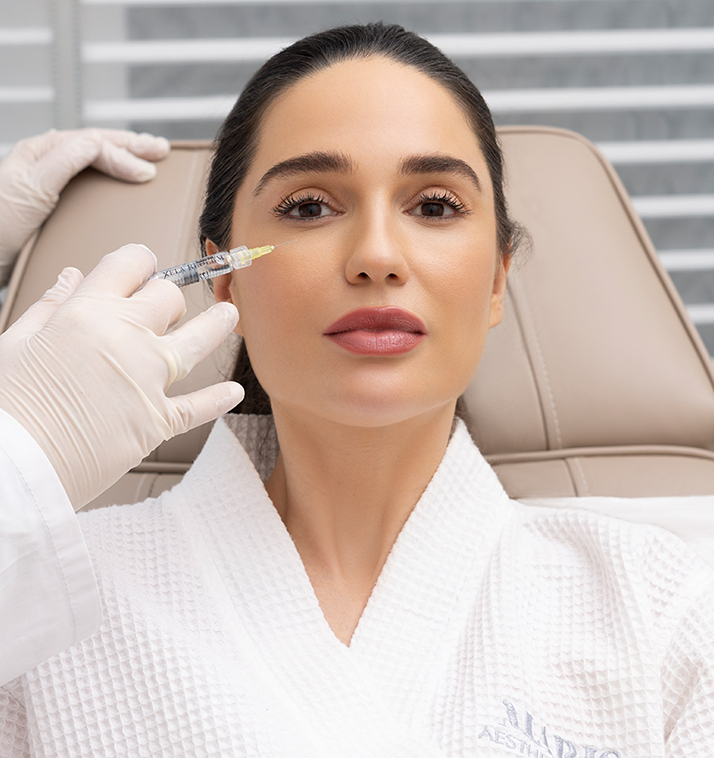CUTTING EDGE CHEMICAL PEEL
Dermamelan is a highly popular skin peel in Dubai that has proven to be very effective in treating melasma and lentigo, which are caused by hormonal pigmentation. Additionally, it reduces freckles, photodamaged skin, and uneven skin tone. It can also make pores smaller, stop breakouts, and control the amount of oil your skin produces. It brings back the skin's brightness and glow. Dermamelan® is secure, adaptable, and suitable for all skin tones. It is the best method for dealing with skin problems brought on by pigmentation.
WHAT IS A CHEMICAL PEEL?
Chemical peels come with various strengths depending on your pigmentation levels and what your skin may need on what you need to fix. A topical chemical solution is applied to the skin, which peels away, leaving a brighter and clearer-looking tone. After a light treatment to improve skin tone and texture and reduce fine lines, the skin gently and slowly peels off. For the best skin treatment in Dubai, a medium chemical peel is advised for a smoother skin texture. You may need multiple light and medium peel treatments for the desired results. With a more extended recovery period, deep chemical peels resurface the skin based on the seriousness of the problem to be addressed.
The best aesthetic clinic in Dubai offers a variety of treatments which will be agreed upon with your consultant before proceeding.
Dermamelan by Mesoestetic®
- The Dermamelan® peel is the best option for treating hormonally induced hyperpigmentation, such as lentigo or melasma.
- It can also help sun-damaged skin and improve uneven skin tone.
- The treatment results in the skin regaining its youthful radiance.
- Once the skin has recovered from the chemical peel, the benefits of hyperpigmentation will start to show. The new, healthy skin has an equal tone and less noticeable pigmentation.
Facts
Best Results
Duration of Result
Comfort
Full Recovery
Treatment Duration
Frequency
Facts
Best Results
Duration of Result
Comfort
Full Recovery
Treatment Duration
Frequency
Process
Before Treatment
- Avoid sun exposure and tanning beds for at least two weeks before the treatment.
- Discontinue using any skin care products containing retinol, alpha-hydroxy acids (AHAs), or beta-hydroxy acids (BHAs) for at least two weeks before treatment.
- Inform the therapist about any medications or supplements being taken, as some may increase the risk of complications during the treatment.
- Do not use any other facial treatments or procedures, such as chemical peels or laser treatments, for at least two weeks before the Dermamelan treatment.
- Stop using any bleaching creams or products containing hydroquinone or kojic acid for at least two weeks before the treatment.
- Inform the therapist of any allergies or sensitivities to skincare products or other substances.
- Arrive at the appointment with a clean, makeup-free face.
Treatment
- You will meet with the doctor at Maris Clinic to assess if Dermamelan is the right treatment for your skin problems.
- The nurse thoroughly cleanses your skin to remove dirt or oils.
- A mask containing a unique blend of ingredients, including azelaic acid and kojic acid, is applied to the skin.
- The mask is left on the skin for a specific amount of time, determined by the doctor, based on the patient's skin condition and the severity of the pigmentation.
- The mask is removed, and the nurse applies a neutralising solution to stop the peeling process.
- You are given a post-care kit containing products to use at home for the next few days to aid healing.
After Care
- Typically you return to the clinic for follow-up sessions one week and then one month after the treatment.
- Avoid exposing your skin to the sun for at least two weeks following the treatment. Wear sunscreen with a 50 SPF, protective clothing, and a hat to shield your face when going outside.
- Do not apply other skincare products or makeup to your face for at least the first few days after the treatment. Your nurse may provide a post-care kit with specific products to use during this time.
- During the first few days, avoid sweating or doing any strenuous exercise that could cause sweating.
- Avoid touching or scratching your face to avoid any irritation.
- It is recommended to continue using sunscreen and avoiding excessive sun exposure even after the first few weeks to maintain the treatment results.
- Follow up with your doctor as instructed and report any unusual symptoms or side effects.
Side effects
- You may experience redness and swelling in the treated area for a few days after the treatment.
- The skin may peel or flake as part of the healing process. This is normal and should subside within a week or two.
- Some people may experience itching or mild discomfort after the treatment.
- In rare cases, the treatment may cause hyperpigmentation, which is a darkening of the skin. This can usually be treated with additional sessions or topical medications.
- In rare cases, the treatment may cause hypopigmentation, which is a lightening of the skin. This can usually be treated with additional sessions or topical medications.
Alternative services
FAQ
- Hormonal pigmentation of the skin leading to melasma and lentigo is a common condition that causes dark patches or spots on the face.
- Melasma is hyperpigmentation due to hormonal changes, such as during pregnancy or while taking birth control pills.
- Lentigo, on the other hand, is a type of pigmented lesion caused by sun damage and typically appears on areas of the skin that have been exposed to the sun, such as the face and hands.
- Both melasma and lentigo are more common in people with darker skin tones and can be challenging to treat without professional help.
- Chemical peels differ in the depth of skin penetration.
- Light peels are great for exfoliating.
- For more significant changes, you will need a deeper peel.
- There are so many choices that it is best to consult a professional to understand what will work best for you.
- People with hyperpigmentation, melasma, lentigo, or other pigmentation disorders on their skin.
- Those with uneven skin tone, dark patches, or spots on their face.
- Individuals who want to improve the appearance of their skin and reduce the signs of ageing.
- People with Fitzpatrick skin types I to VI.
- Individuals who are not currently pregnant or breastfeeding.
- Those committed to following the recommended aftercare steps, including avoiding sun exposure and using high-quality sunscreen.
Book Appointment
Due the high demand & limited availability we recommend booking 2-3 weeks in advance




